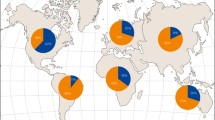Abstract
Northern communities across the circumpolar Arctic face water challenges that are particularly difficult to both manage and mitigate in the face of ongoing environmental change. This chapter draws from the history of freshwater security across northern Canada. Vulnerability is contextualized, the ethical considerations of Inuit as environmental stewards are outlined, and directions for planning and development of freshwater resources in a warming future are proposed.
Access this chapter
Tax calculation will be finalised at checkout
Purchases are for personal use only
Similar content being viewed by others
Notes
- 1.
The 1939 Supreme Court of Canada decision ruled Inuit would be considered “Indians,” and as a result were subject to the Indian Act, which deemed them to be wards of the Crown. This was then strengthened and enforced by the Family Allowance Act of 1944, requiring the Canadian government to formally claim responsibility for Inuit (Tester and Kulchyski 1994).
References
Aporta C (2009) The trail as home: Inuit and their pan-Arctic network of routes. Hum Ecol 37(2):131–146
Bakaic M, Medeiros AS (2017) Vulnerability of northern water supply lakes to changing climate and demand. Arct Sci 3(1):1–16. https://doi.org/10.1139/as-2016-0029
Cameron E (2011) Development, climate change and human rights from the margins to the mainstream? Social development working papers 123. The World Bank, Washington, DC. https://doi.org/10.1596/27308
Daley K (2013) A qualitative case study of relationships between public health and municipal drinking water and wastewater in Coral Harbour, Nunavut. Unpublished master’s thesis, Theses Canada. AMICUS no. 42001092
Dowsley M, Gearheard S, Johnson N, Inksetter J (2010) Should we turn the tent? Inuit women and climate change. Études/Inuit/Studies 34(1):151–165
Friesen M, Finkelstein S, Medeiros AS (2019) Climate variability of the common era (AD 1–2000) in the eastern North American Arctic: impacts on human migrations. Quaternary International, June 11. https://doi.org/10.1016/j.quaint.2019.06.002
Gearheard S, Pocernich M, Stewart R, Sanguya J, Huntington HP (2010) Linking Inuit knowledge and meteorological station observations to understand changing wind patterns at Clyde River, Nunavut. Clim Chang 100(2):267–294
Heyes S (2007) Inuit knowledge and perceptions of the land–water interface. Unpublished master’s thesis, Theses Canada AMICUS no 34436174
Huntington H, Fox S (2005) The changing Arctic: indigenous perspectives. In: Arctic climate impact assessment. Cambridge University Press, Cambridge
Laidler G (2012) Societal aspects of changing cold environments. In: French H, Slaymaker O (eds) Changing cold climates: a Canadian perspective. Wiley-Blackwell, Oxford, pp 267–300
Medeiros A, Luszczek C, Shirley J, Quinlan R (2011) Benthic biomonitoring in Arctic tundra streams: a community-based approach in Iqaluit, Nunavut, Canada. Arctic 64(1):59–72. https://doi.org/10.14430/arctic4080
Medeiros AS, Wood P, Wesche SD, Bakaic M, Peters JF (2017) Water security for northern peoples: review of threats to Arctic freshwater systems in Nunavut, Canada. Reg Environ Chang 17(3):635–647. https://doi.org/10.1007/s10113-016-1084-2
Milloy J (1999) When a language dies. Index Censorsh 28(4):54–64
Pearce SM (1987) Ivory, antler, feather and wood: material culture and the cosmology of the Cumberland Sound Inuit, Baffin Island, Canada. Can J Nativ Stud 7(2):307–321
Richmond CA, Ross NA (2009) The determinants of First Nation and Inuit health: a critical population health approach. Health Place 15(2):403–411. https://doi.org/10.1016/j.healthplace.2008.07.004
Simon M (2011) Canadian Inuit. Where we have been and where we are going. Int J 66(4):879–891. https://doi.org/10.1177/002070201106600415
Statistics Canada (2010) The health of First Nations living off-reserve, Inuit, and Métis adults in Canada: the impact of socio-economic status on inequalities in health. Statistics Canada, Ottawa
Tester FJ, Kulchyski PK (1994) Tammarniit (mistakes): Inuit relocation in the Eastern Arctic, 1939–63. UBC Press, Vancouver
Assembly UG (2007) United Nations declaration on the rights of indigenous peoples: resolution/adopted by the General Assembly, 2 October 2007. A/RES/61/295
Watt-Cloutier S (2015) The right to be cold: one woman’s story of protecting her culture, the Arctic, and the whole planet. Penguin, Toronto
Weatherhead E, Gearheard S, Barry RG (2010) Changes in weather persistence: insight from Inuit knowledge. Glob Environ Chang 20(3):523–528
Wenzel GW (2009) Canadian Inuit subsistence and ecological instability: if the climate changes, must the Inuit? Polar Res 28(1):89–99. https://doi.org/10.3402/polar.v28i1.6103
Wesche SD, Ohare-Gordon MA, Robidoux MA, Mason CW (2016) Land-based programs in the Northwest Territories: building indigenous food security and well-being from the ground up. Can Food Stud 3(2):23–48. https://doi.org/10.15353/cfs-rcea.v3i2.161
Wright CJ, Sargeant JM, Edge VL, Ford JD, Farahbakhsh K, RICG, Shiwak I, Flowers C, IHACC Research Team, Harper SL (2018a) Water quality health in northern Canada: stored drinking water and acute gastrointestinal illness in Labrador Inuit. Environ Sci Pollut Res 25(33):32975–32987. https://doi.org/10.1007/s11356-017-9695-9
Wright CJ, Sargeant JM, Edge VL, Ford JD, Farahbakhsh K, Shiwak I, Flowers C, Gordon AC, Harper SL (2018b) How are perceptions associated with water consumption in Canadian Inuit? A cross-sectional survey in Rigolet, Labrador. Sci Total Environ 618:369–378. https://doi.org/10.1016/j.scitotenv.2017.10.255
Author information
Authors and Affiliations
Corresponding author
Editor information
Editors and Affiliations
Rights and permissions
Copyright information
© 2021 Springer Nature Switzerland AG
About this chapter
Cite this chapter
Medeiros, A.S., Niemeyer, A. (2021). Water Security Challenges in the Canadian Arctic. In: Stefanovic, I.L., Adeel, Z. (eds) Ethical Water Stewardship . Water Security in a New World. Springer, Cham. https://doi.org/10.1007/978-3-030-49540-4_7
Download citation
DOI: https://doi.org/10.1007/978-3-030-49540-4_7
Published:
Publisher Name: Springer, Cham
Print ISBN: 978-3-030-49539-8
Online ISBN: 978-3-030-49540-4
eBook Packages: Earth and Environmental ScienceEarth and Environmental Science (R0)




